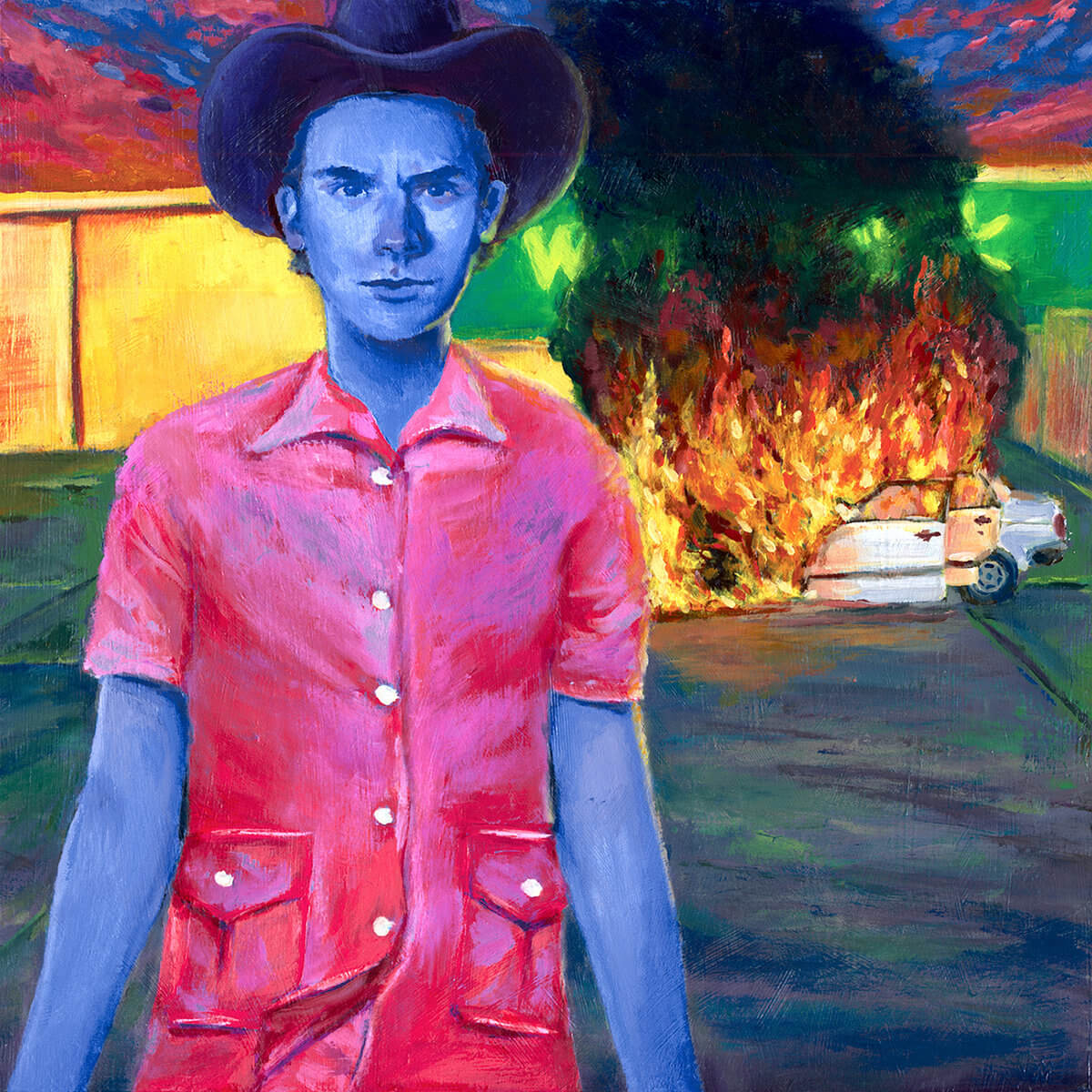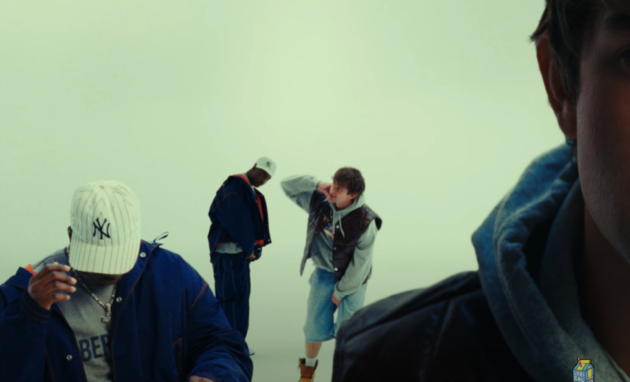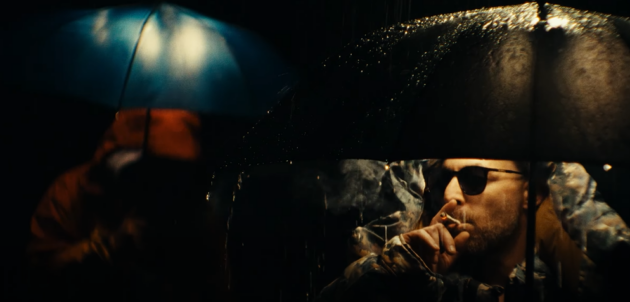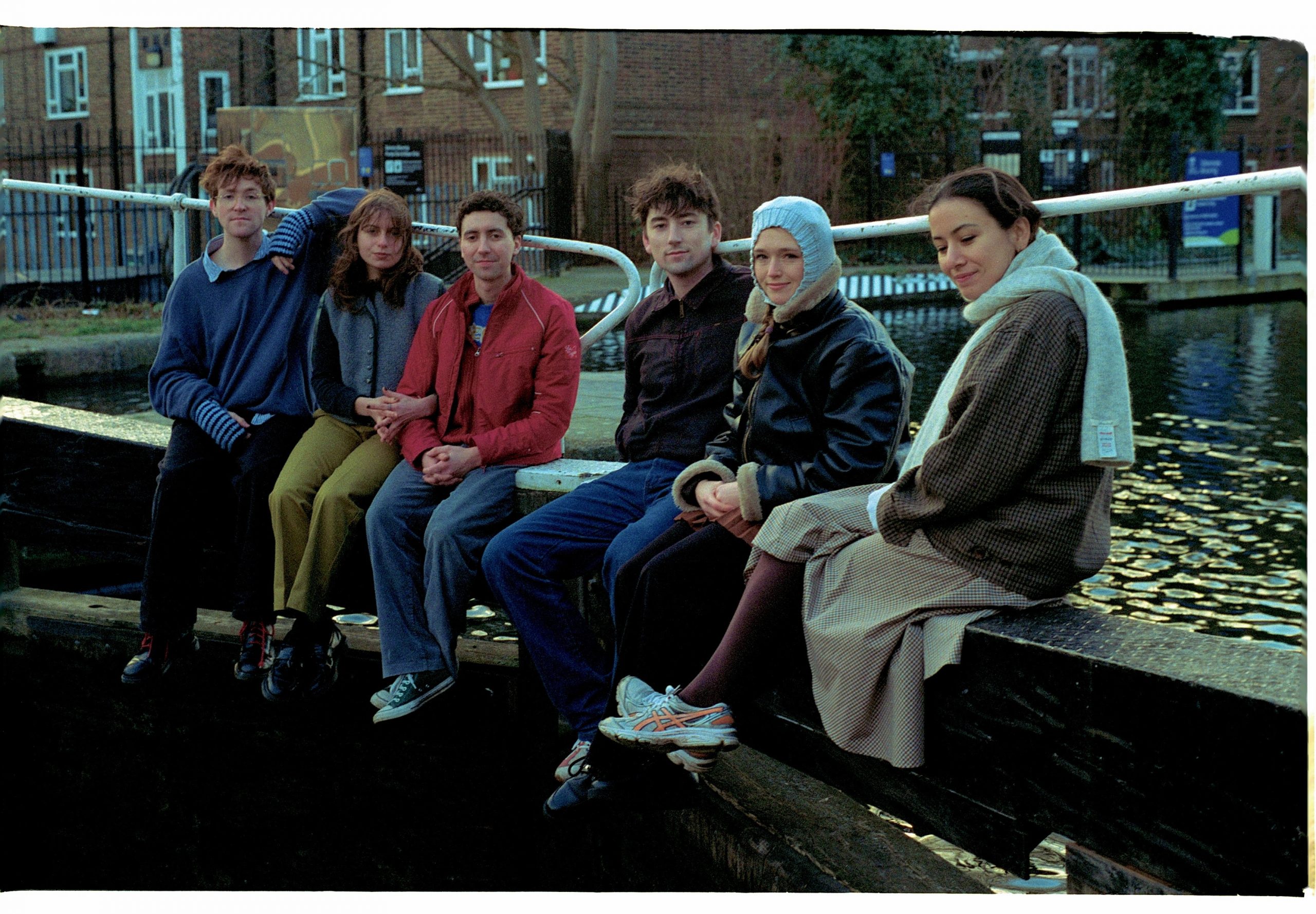With The Happiest Times I Ever Ignored, Texas guitarist Hayden “Kid Candidate” Pedigo wordlessly shares stories of fate and sustaining hope. A meticulous and detailed player, he’s spent the last decade refining and shaping his sound, pushing for ultimate clarity of expression. But just give that cover painting by Jonathan Phillips a good look: Pedigo is just as interested in stoking creative impulses that align him with his comedic heroes—here’s a guitarist who borrows from Harmony Korine nearly as much as John Fahey and names albums after quotes by National Lampoon co-founder Doug Kenney.
Today, Pedigo joins us to discuss bringing the unexpected into his work, the virtues (and drawbacks) of “being a hater,” and why he remains so interested in pushing the boundaries of the acoustic guitar canon. | j woodbury
Aquarium Drunkard: I’ve really enjoyed the time I’ve spent with The Happiest Times I Ever Ignored. I especially like the videos you’ve created for it, namely “Elsewhere.” Watching that, it’s clear you’re someone who views videos as artistic expressions in and of themselves, not just promotional tools.
Hayden Pedigo: That’s funny. My first album Seven Years Late came out a little over 10 years ago, when I was 18. It’s taken me 10 years to find a way to combine all these parts of who I am. The “Elsewhere” video was the first time where everything came together in a natural way that didn’t feel forced. I feel like the artist I want to be, but it’s only just now happening.
AD: What about this record helped you shift into that more complete sense of what you’re doing?
Hayden Pedigo: I think Letting Go felt like my debut album, it was my first record for a bigger audience. I felt really proud of that record—more so than any record I had done before. With that one, the album art was strange. I was finally getting a chance to flex a weird muscle with my music, which I hadn’t done before. You look at an album like Greetings from Amarillo, which has some experimental things on the record, but the cover’s very traditional looking. [Laughs] I’m thinking of Tim Heidecker—he’s a comedian who’s transitioning into this phase of being a serious musician. I’m a musician who’s trying to transition into the space of a comedian. I feel like people are starting to understand, “Oh, this guy does some pretty weird stuff and it’s showing up in the music now.”
AD: I know you’re a big Harmony Korine fan. And something I think about when I consider his work, or work by Tim Heidecker, or Nathan Fielder, or a show like How To With John Wilson, his how those people work in comedy, but there’s a darkness too. And strangeness, and an uncanny feeling—they cover a lot of thematic territory. I think how on one hand, you are embracing a kind of Takoma School formalism with this record, but also blowing up the concept.
Hayden Pedigo: It’s weird, ‘cause I was talking to someone before about how I feel like a lot of my art and music is born out of bad vibes, negativity, and being a hater. [Laughs] The most toxic way to make art. The way I make music is very competitive. I want to make the best record I can, but on top of that, I want it to be somewhat provocative. You look at Jim O’Rourke. He had these covers and some of them were very off-putting. Like, “Oh wow, that’s very off-putting.” And then it’s like the most pleasant music you’ve ever heard in your life. It’s almost like those memes where it’s like “Jim O’Rourke’s music/Jim O’Rourke’s album covers,” as if they are two opposing things that just have nothing to do with each other.
AD: You mentioned Tim Heidecker, and along with him and Eric Wareheim and Space Ghost: Coast to Coast, that was some of the first subversive art that I encountered. What was getting into that stuff like for you?
Hayden Pedigo: I need to go back further than that, because probably I’ll say the person who influenced my comedy the most was Tom Green. He’s misunderstood. I feel like people still haven’t caught up to what he was doing. It’s interesting to think about the era of time where he was viewed as the butt of a lot of jokes in comedy. Like we’re talking he was perceived as “bad comedy” in people’s eyes. But you see his public access show, The Tom Green Show or Freddy Got Fingered now and it’s clear the guy was so ahead of everyone. It’s genuinely frightening. That stuff deeply inspired me. There was a punk ethos to the way he worked that needs to be discussed further. We owe it to Tom Green to reassess his work. I will forever be frustrated if I feel like he’s not given that credit, which he still hasn’t been in my opinion.
AD: It’s a little bit of a John the Baptist scenario, where you bring a new thing around but you get your head chopped off. Have you ever reached out to him?
Hayden Pedigo: I’ve met Tom Green and I’ve talked to him on the phone multiple times. Not like, flexing, but it’s crazy. I’ve told him, “You’ve influenced me insanely.” Everyone just needs to go back and watch The Tom Green Show. It’s super sharp. There are some goofy skits, but there’s also some true, truly outsider things in it.
AD: You mentioned being a competitive person. I thought it was interesting how you addressed it, saying you “Wanted to make the best guitar record of the last 20 years.”
Hayden Pedigo: The sticker on the actual LP says, “This is the best guitar of the past 100 years” [Laughs] The label was like, “Wait, are you wanting to put this on there?” And we were like, yeah, that’s a joke. A hundred years is comical. 20 years is honest, you know? But 100? What does that even mean?
AD: I’m curious about your actual drive, really wanting to do something powerful and in some sense, “the best,” as you define it. How did you approach the goal of making the best guitar album of the last 20 years?
Hayden Pedigo: I guess I’m kind of like an athlete who watches reels of other players to see what they’re doing, what their techniques are. I listen to everyone’s albums. I see how everyone is playing. I see what level they’re at. I challenge myself to go, “You know, I could do better than that.” It’s people that I respect and admire. I’m not saying, “Oh, their records suck.” They’re good records, but my goal is to be better than what they’re doing, to be frank. But that gets us into the discussion of, “All art is equal.” And you know, It’s not a competition. But I still ask myself, “How could I top that?”
If I’m being like, “All this shit is trash, I’m like the only one doing anything that matters,” that’s negative competition. But there’s a reason I tell people, “I don’t make b-sides.” I don’t do singles. Everything is on the album. I finished writing Letting Go in fall of 2020 and I didn’t write another song until February of 2022. I don’t put out a lot of music. I don’t write a lot of music. I don’t have a hard drive with a hundred songs sitting on it somewhere.
AD: Is it important for you to have that time between periods of creative work? Do you feel like that space informs the internal world that eventually makes its way into the songs?
Hayden Pedigo: Absolutely. I approach music like a filmmaker. I need gaps in between films to work on the next one. You need some time to ensure you make a good thing. If a director told you, “Yeah, I have four movies in the works right now,” would that inspire you? Would you get your hopes up about those movies?
AD: There’s a big part of this album rooted in the work of John Fahey, a hero of yours, but there’s a certain melancholy and sweetness in the playing too. You fold in a lot of things.
Hayden Pedigo: Christopher Owens of Girls is one of my biggest inspirations for songwriting ever. Christopher lived in Amarillo for over a decade and moved away to San Francisco in his twenties. The thing I find most intriguing about Girls is that you hear them almost rip off so many classic things from so many classic songs. But they basically make them brand new. There’s a reverence to the way Christopher references Beach Boys or Roy Orbison or the Everly Brothers. It’s not just music, it was a thing that saved his life. It was the lighthouse in a very dark reality. So it transcends music. You can tell it is a religious reverence and it shows in the music. So I do that too. You can get a hint of Simon and Garfunkel.
Beyond that, I’m gonna try to not sound like a hater, but I feel the current state of solo guitar, and this is just my opinion, so hopefully no one gets upset about this, but there’s too much rambly guitar music, to a point where I feel like no one’s writing songs. Sure, there’s some rambling, esoteric guitar music I can get into, but after a while I’m just so tired of hearing an open-tuned guitar. The reason William Ackerman sounds so good is because he’s playing songs.
AD: I take it you listen pretty widely outside of the acoustic guitar world.
Hayden Pedigo: I listen to a lot of rap. I’m really just interested in “what’s forward thinking, what’s brand new? What is art being created in a way that hasn’t been done before?” That doesn’t happen in solo guitar music for the most part. I pull from the ethos of forward thinking artists. That doesn’t mean the music or the actual material. But I think if you’re a solo guitar player and you’re influenced by Earl Sweatshirt, Boldy James, Francis Bacon, and Gucci clothing—that’s an influence—it’s just all about “what’s forward thinking.”
AD: And it’s always so interesting the weird things that get in because of that.
Hayden Pedigo: You hear it a lot in Bradford Cox, his work with Deerhunter and his solo work. There are so many little things you can pick out, like “That’s kinda like The Ronettes,” or “Oh, that feels like Can.” But it’s all Deerhunter. Southern fried, weird. It doesn’t feel like any of those things at all. That’s what’s cool about the game of telephone with influences—it just gets diluted, distorted, blown up, and damaged. Girls doesn’t sound like the Everly Brothers, but it does feel like, you know, the Everly Brothers cooked on the same grill as Spiritualized. A certain sandwich that you’ve just never tasted before.
AD: Well, that metaphor is making me hungry. It’s been great talking, and a real pleasure to watch your music grow over the last decade.
Hayden Pedigo: A couple weeks ago, I emailed Daniel Bachman a photo of a photo we took in a coffee shop in Canyon, Texas. I was like, “Dude, I graduated high school a few weeks before this photo was taken. [Laughs] It’s just kind of weird like talking to him now. It’s like wow, so much has changed. It’s so cool.
AD: Talk about another artist who’s absolutely keeping on their toes in terms of not settling into patterns.
Hayden Pedigo: Daniel is one of very few people in the solo guitar world that have truly become a true frightening level artist. He’s become more like Scott Walker, a complete reinvention into something. You listen to Almanac Behind, and you can tell immediately he’s doing something new. And if you go back to his early stuff under Sacred Harp, it’s intriguing—it’s nearly the same as his new material. He had it right from the jump.
Only the good shit. Aquarium Drunkard is powered by our patrons. Keep the servers humming and help us continue doing it by pledging your support via our Patreon page.



